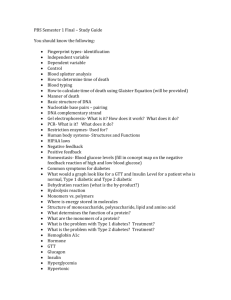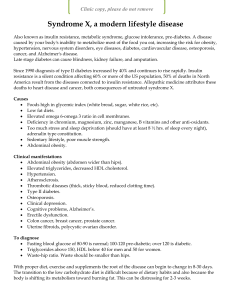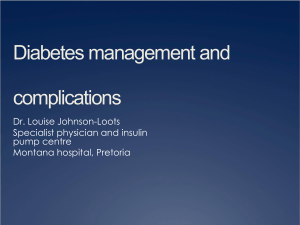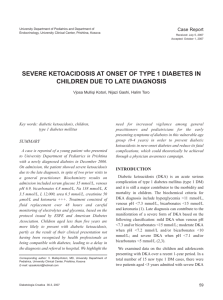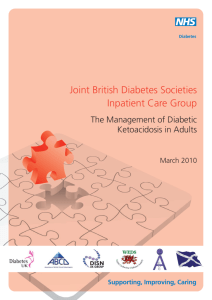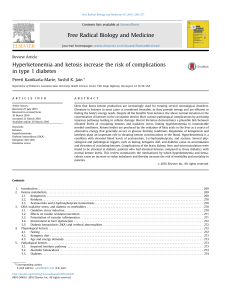Sick Day Management
advertisement
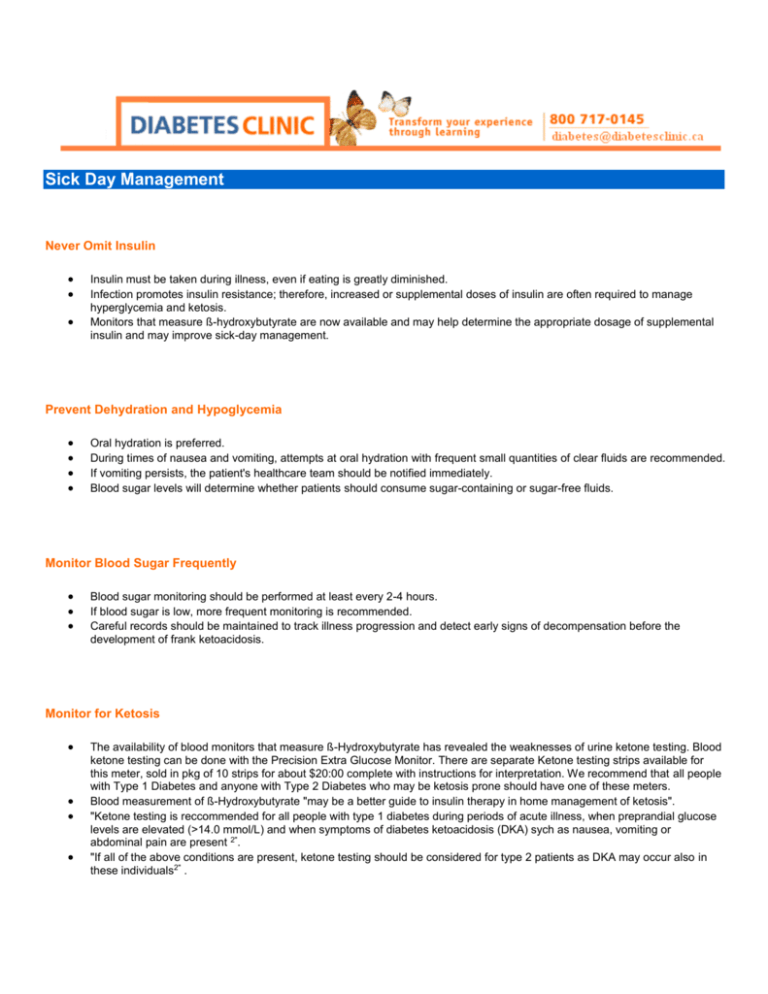
Sick Day Management Never Omit Insulin Insulin must be taken during illness, even if eating is greatly diminished. Infection promotes insulin resistance; therefore, increased or supplemental doses of insulin are often required to manage hyperglycemia and ketosis. Monitors that measure ß-hydroxybutyrate are now available and may help determine the appropriate dosage of supplemental insulin and may improve sick-day management. Prevent Dehydration and Hypoglycemia Oral hydration is preferred. During times of nausea and vomiting, attempts at oral hydration with frequent small quantities of clear fluids are recommended. If vomiting persists, the patient's healthcare team should be notified immediately. Blood sugar levels will determine whether patients should consume sugar-containing or sugar-free fluids. Monitor Blood Sugar Frequently Blood sugar monitoring should be performed at least every 2-4 hours. If blood sugar is low, more frequent monitoring is recommended. Careful records should be maintained to track illness progression and detect early signs of decompensation before the development of frank ketoacidosis. Monitor for Ketosis The availability of blood monitors that measure ß-Hydroxybutyrate has revealed the weaknesses of urine ketone testing. Blood ketone testing can be done with the Precision Extra Glucose Monitor. There are separate Ketone testing strips available for this meter, sold in pkg of 10 strips for about $20:00 complete with instructions for interpretation. We recommend that all people with Type 1 Diabetes and anyone with Type 2 Diabetes who may be ketosis prone should have one of these meters. Blood measurement of ß-Hydroxybutyrate "may be a better guide to insulin therapy in home management of ketosis". "Ketone testing is reccommended for all people with type 1 diabetes during periods of acute illness, when preprandial glucose levels are elevated (>14.0 mmol/L) and when symptoms of diabetes ketoacidosis (DKA) sych as nausea, vomiting or abdominal pain are present 2". "If all of the above conditions are present, ketone testing should be considered for type 2 patients as DKA may occur also in these individuals2" . Provide Supplemental Fast-Acting or Rapid-Acting Insulin During any period of intercurrent illness, blood sugar and ketone levels should be monitored every 2-4 hours. "Supplemental doses of fast-acting (regular) or rapidly acting (lispro) insulin should be administered in addition to usual insulin dosages whenever hyperglycemia and ketosis are present". Treat Underlying Triggers Viral infections not requiring specific prescriptive therapy may still elevate blood glucose and produce ketosis, making sick-day management necessary. Patients with a history of recurrent diabetic ketoacidosis (DKA), known eating disorders or psychosocial problems, or poor glycemic control are at risk for decompensation. These patients should call their health care team at the first sign of illness or decompensation. Maintain Frequent Contact With the Medical Team Patients and family members need to look for signs that medical attention is needed, including: Continued vomiting lasting more than 2-4 hours Persistent ketones for more than 12 hours Signs of dehydration, including dry mouth, weight loss or sunken eyes Symptoms of DKA development, including nausea, abdominal or chest pain, ketotic breath, hyperventilation or altered consciousness Conclusions Sick-day management requires increased monitoring of blood glucose and assessment for ketosis. The American Diabetes Association states that blood ketone testing is preferred over urine ketone testing as a more reliable method of diagnosing diabetic ketoacidosis. 1 References 1 © 2004 American Diabetes Association. From Diabetes Care, Vol. 27, Supplement 1, 2004; S91-S93. Reprinted with permission from The American Diabetes Association. This is not intended to be taken as an endorsement by the American Diabetes Association. 2. Canadian Diabetes Association. 2003 Clinical Practice Guidelines for the Prevention and Management of Diabetes in Canada. This is not intended to be taken as an endorsement by the Canadian Diabetes Association.


